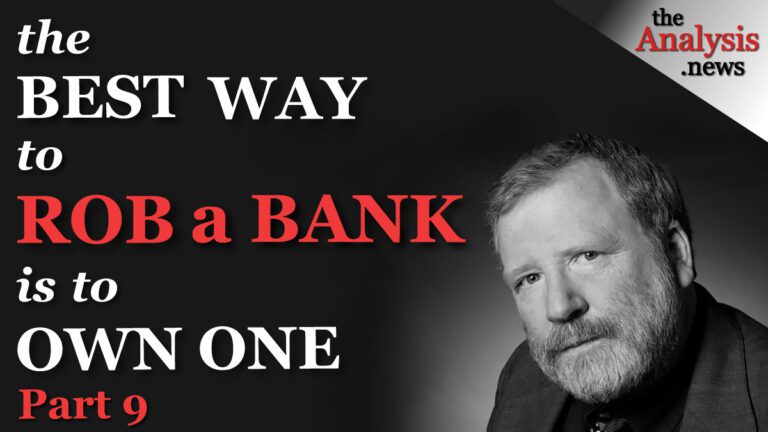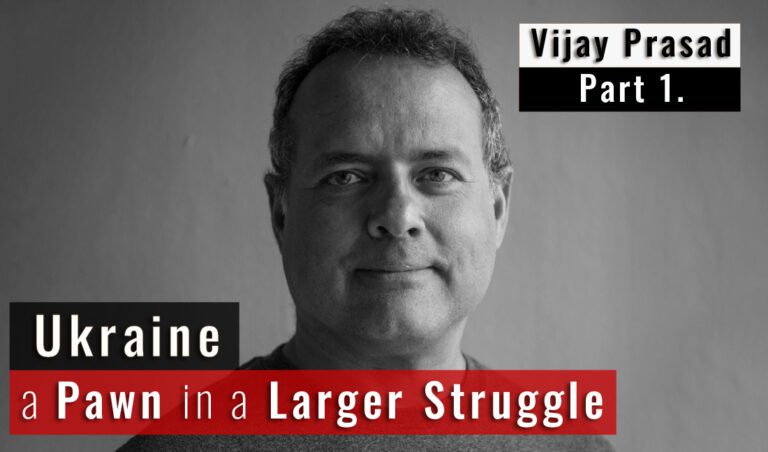This interview was originally published on June 9, 2011. Lawrence Wilkerson, Collin Powell’s former Chief of Staff, reflects on his life journey from “cold warrior” to harsh critic of US foreign policy.
Reality Asserts Itself with Lawrence Wilkerson (2011)
PAUL JAY, SENIOR EDITOR, TRNN: Welcome to The Real News Network. I’m Paul Jay in Washington. We’re continuing our series of interview with Colonel Lawrence Wilkerson. Thanks for joining us again. Alright. So February 2003, Colin Powell’s, I guess, asked by the president, is it, to make a presentation to United Nations to look over the intelligence and make the case for war. So talk about this period, what your participation in it was, and then later how this all affected you.
LAWRENCE WILKERSON, FMR. CHIEF OF STAFF TO COLIN POWELL: Well, in late January he was asked to do it, and we immediately went to Dr. Rice and said this is ridiculous, too little time. The presentation was on February 5; about 7 days. She said, you’re right; let’s ask for more time. Then she came back a little bit later and said, sorry, we’ve already made the public announcement, so you’ve got to do it. So here we are with roughly seven days and nights to get ready for this monumental presentation at the UN Security Council. I relocated to the CIA headquarters at Langley, I took my team with me, and we essentially worked night and day for five days and nights, and then relocated to New York. In the middle of this we had the shuttle go down and lost our White House team, only to plead with Condi Rice that we were more important than the president going to Houston and giving some speech about the astronauts being killed. It was a bad moment.
JAY: Now, in terms of your own–how persuaded you are, I know there’s only seven days to look at it, but you’ve had–your department’s been looking at it, Greg Thielmann and others at State.
WILKERSON: Didn’t have any INR people with me there, because Carl Ford had said the secretary knew what he felt and didn’t need to send anybody over there. In retrospect, that was a very bad decision by my boss, a bad decision by me to adhere to it and to go along with it, and a bad decision by the deputy, Richard Armitage [crosstalk]
JAY: Not to have your own State Department experts with you.
WILKERSON: Not to have somebody over there with me, because had I had Carl over there with me or someone from Carl, I would have probably challenged George and John with a little more authority from time to time. In other words, I would have had them whispering in my ear and saying, don’t believe that for a minute. You know. And I would have known [crosstalk]
JAY: I mean, you’re a military man, but you’re not an expert in doing diagnostics of intelligence, are you?
WILKERSON: I’m listening to the director of Central Intelligence, the man that briefs the president. I’m listening to him tell me, and from time to time the secretary of state, what the situation is in the American intelligence community, and as he made clear to me on a number of occasions, speaking for France, England, Germany, Israel, Australia, and a host of other people who had the same view we did about the position of WMD by Baghdad.
JAY: Which may have been true about some of the politicians in those governments but we now know was not true about most of their intelligence agencies.
WILKERSON: Well, there were–as always, there were fights in intelligence communities. There were people, I think, in every one of those countries who actually thought he had WMD. There were also people who didn’t think he had WMD.
JAY: Now, you already by this time have some pretty deep suspicions, reservations about Cheney and Rumsfeld and that whole group. What’s your thinking as you’re sitting listening to this? Are you feeling that you and your boss are being set up or not?
WILKERSON: My thinking is, I want out of here; I’m resigning.
JAY: So why didn’t you?
WILKERSON: I did. I just didn’t have the guts to submit it.
JAY: You wrote it?
WILKERSON: I wrote my resignation, yes. When the secretary of state asked me if I wanted to give the team, who had done a spectacular job–even the White House people who’d helped me, all of them, they’d done a great job–he said, you want to give them something? I said, yes, I want to give them a letter from you and give them a little plaque, you know, something, we’ve got to give them something, ’cause these guys didn’t sleep. I mean, I had a speechwriter sitting at the computer one morning, 2 a.m. in the morning, telling her 80-year-old father how to get to his insulin tablets in the refrigerator, because she wasn’t at home with him and hadn’t been at home with him for four straight nights. I mean, this was–.
JAY: This is during the seven days of prepping.
WILKERSON: Yes. This was–we were there. You couldn’t leave. We were–.
JAY: But when do you write a letter of resignation? During this seven days?
WILKERSON: Oh, yeah, absolutely. Scratched it out on the back of an envelope and went back and typed it out in my office in the State Department. And when Powell said, okay, I went around personally and gave the awards to everybody, went to the White House, went to the DCI’s office, and gave the awards to those who had helped us. And then I came back to my office and sat down behind my desk. This is literally what happened. And Powell walks into my office through the door that adjoined our offices, and he says, what are we going to give you? You’ve gotten [incompr.] I said, I don’t want a damn thing. And he just turned around and walked back in his office. And a few minutes later he came in with a handwritten letter to me, thanking me for my superb work and so forth and so on. I tore it up and threw it in the trashcan.
JAY: So–.
WILKERSON: That’s how bad I felt about the presentation, which I thought was hokey, circumstantial crap. And then I realized later that, you know, Colin Powell had given it. He had Mother Theresa poll ratings. That’s the reason it was effective, because Colin Powell gave it. When Colin Powell held up that little thing and said, not in a post-9/11 world and so forth can we have this doubt and so forth, people believed him. They wouldn’t have believed Dick Cheney. They wouldn’t have believed George Bush. They wouldn’t have believed Condi Rice. I mean, the right-wing nuts would have, but not the basic people in America we wanted to convince. But they believed Colin Powell.
JAY: Did you tell Powell you thought it was crap?
WILKERSON: I don’t think I ever said it in that straightforward of terms.
JAY: Why?
WILKERSON: Because, frankly, I didn’t realize how basic circumstantial evidence was being put together to present a position that could be very, very different from what the evidence was being interpreted as being, until I saw the whole presentation on the floor of the UN Security Council the day it was actually given, ’cause everything had always been segmented, hurried, rushed–piece here, piece there–beforehand. And what I saw was things like–take the intercepts, which I thought were powerful. They were probably the most effective part of the presentation. But you listen to the intercepts, which we had taken great pains to make sure were interpreted right, because they were intercepted in Arabic, separate translations and so forth, but you hear, for example, of Captain Ibrahim being told to get rid of a piece of equipment that’s restricted under the sanctions. Well, you can interpret that either way. You can say, well, he’s getting rid of the equipment because he doesn’t want the inspectors to find it, or you can say he’s getting rid of the equipment because it violates sanctions. That’s–I mean, it could be either way. Same with the intercept about the communications instructions: take nerve agent codeword out of your communications instructions. This is an intercept. Well, maybe he’s taking it out because they no longer have any nerve agents, and so they didn’t have any need for it in their communications instructions. Or maybe he’s taking it out because he doesn’t want the inspectors to find it. Who knows? That’s what I mean by circumstantial evidence that can be interpreted more than one way. And when I watch that whole presentation for, what, an hour and twenty minutes or so–.
JAY: You were sitting right behind him.
WILKERSON: I was sitting in the side, looking at him, and George Tenet was sitting right behind him. And Assistant Secretary Holmes for International Organizations, and John Negroponte, ambassador to the UN, are all in that picture frame. And Powell had told Tenet at the last rehearsal at the US mission in New York, that night before, about 10 p.m., when we were wrapping up the last rehearsal, he told Tenet, you’ll be sitting right with me on camera, which is strange. I mean, you usually don’t expose a CIA director that way. He’s sitting right there on camera with Powell. And Powell wanted to make the point to him that you’re being implicated in this, too. If it’s wrong, you’re wrong as well as I.
JAY: And did Powell give you any sense that he had any of the kind of doubts that you did?
WILKERSON: Much earlier.
JAY: It sounds like you had more than doubts.
WILKERSON: Much earlier. Much earlier. In November 2002, he walked into my office and he mused, almost as if asking a rhetorical question, because I offered no comment: I wonder what will happen if we put half a million troops on the ground and scour the country from one end to the other and find nothing?
JAY: So why didn’t Powell quit? Powell could have maybe stopped the war.
WILKERSON: It’s not that–it’s not his character. It’s not his character to quit. It’s his character to keep going and keep trying to change things. It’s his character to keep cleaning the dog poop off the carpet in the Oval Office.
JAY: The knock on you, people say, is Wilkerson’s become a very strong critic of US policy now, but he went along with this at that critical moment.
WILKERSON: Guilty. Guilty as charged. I went along with it because I felt I owed that kind of loyalty to my boss. And, frankly, I wasn’t sure that if someone else became secretary of state, that they could stand up to the Cheney-Rumsfeld cabal the way Powell did. And I’d already seen it do enough damage. Frankly, I was very, very relieved to leave the State Department in January 2005. On the other hand, I was very concerned about Powell leaving, because I didn’t see anybody who could stand up to Cheney and Rumsfeld the way Powell had. Now, I will say that Dr. Rice did her job in that respect, I think, because we get Bush actually waking up and we get him firing Donald Rumsfeld in February 2006, as I recall–or maybe it was in November 2006. And then I think Cheney becomes more and more marginalized as we move on through the second administration and Bush actually takes over, for example, directly takes over personal management of the war in Iraq with Petraeus. So if Cheney is edged out more and more as the second administration goes along, so my fears were not fulfilled in that respect. Dr. Rice was at least able, from her position at Foggy Bottom, to use her personal affinity for and with the president to check them a little bit, I think.
JAY: Okay. One final segment of the interview to come. Please join us for the end of our series of interviews, at least for now, with Larry Wilkerson on The Real News Network.
Never miss another story
Subscribe to theAnalysis.news – Newsletter
Lawrence Wilkerson is a retired United States Army Colonel and former chief of staff to United States Secretary of State Colin Powell.












